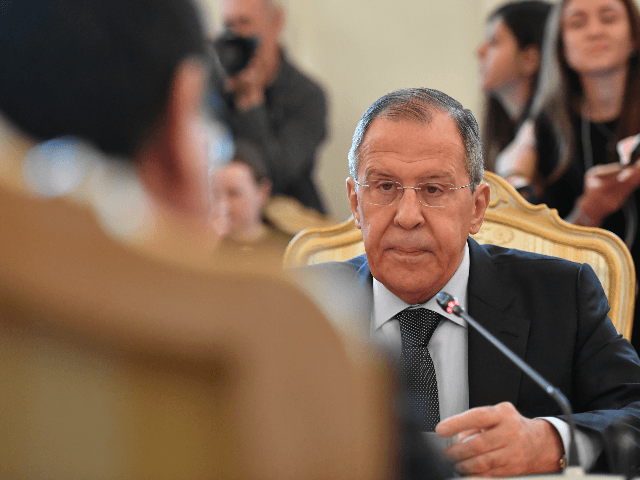Russian Foreign Minister Sergei Lavrov claimed on Wednesday his government is in talks with Venezuelan President Juan Guaidó, despite Russia’s role as chief global enabler of the socialist regime of Nicolás Maduro.
Lavrov claimed he had spoken with Guaidó about a proposal known as the “Montevideo Mechanism,” but complained that he was being “manipulated by the U.S.” after he rejected the idea.
“During these conversations, we reaffirmed our position in favor of a national dialogue, expressed disagreement with the fact that in response to the call by the ‘Montevideo Mechanism’ to start such a dialogue, when President [Nicolas] Maduro agreed, [opposition leader Juan] Guaido haughtily refused,” Lavrov told the Russian media outlet RBC.
According to Venezuelan state media, the “Montevideo Mechanism” is a four-phase negotiation aimed at resolving differences between the socialist regime and the opposition.
Lavrov also claimed that a new round of talks between Guaidó, who became the legitimate president of Venezuela in January, and Maduro had occurred in Norway, and that it was a “step in the right direction” despite yielding no results.
Shortly after Lavrov’s comments, Russian President Vladimir Putin dismissed supporters of Guaidó as “crazy.”
“He’s a nice guy. My attitude towards him is normal, totally neutral,” Putin said. “But if we introduce this practice, this method of getting into power … is this normal? … I’d like to ask that of those who support this. Did they go crazy?”
Putin claimed that Guaidó came to power by “standing in a square, looking up to the sky and before God proclaiming himself head of state.” In reality, the National Assembly, the federal legislature, swore Guaidó into office as mandated by the Venezuelan Constitution in the event of a president attempting to usurp power unconstitutionally, as Maduro had done by refusing to end his term that month.
Guaidó’s willingness to engage in talks with the Maduro regime has come as a major disappointment to the majority of Venezuelans, many of whom believed he could regain control of the country by getting the military to back him. A nationwide poll taken last month found that 87.6 percent of Venezuelans opposed a dialogue with the regime, while little over ten percent of respondents said they supported talks.
Following the last round of talks last month, the Norwegian government said that the two sides were willing to “move forward,” although Guaidó denied the optimism.
“The mediation meeting that we attended at the invitation of the government of Norway in Oslo has concluded,” he wrote in a statement on Twitter. “We have ratified our route: the end of the usurpation, a transition government, and free elections as the way to solve the tragedy that our Venezuela suffers today.”
“That meeting ended without agreement. We have insisted that mediation will be useful for Venezuela so long as there are elements that allow the advance towards a true solution,” he continued. “Therefore, we remain in the struggle until we resolve the crisis all Venezuelans suffer. Thus, the process does not deter efforts through all constitutional avenues.”
Russia continues to heavily interfere in Venezuela’s political crisis, providing crucial financial and military support to the Maduro regime and helping them to repress opposition. However, there are indications that Moscow is losing patience with the regime. The Wall Street Journal last weekend reported that they had withdrawn key military advisors from the country over lack of payment. Russia denied the report.
Follow Ben Kew on Facebook, Twitter at @ben_kew, or email him at bkew@breitbart.com.

COMMENTS
Please let us know if you're having issues with commenting.